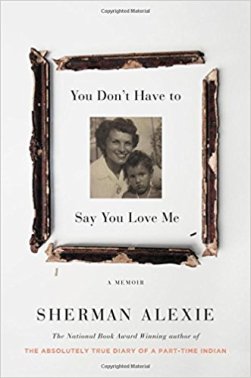Have you read this?

If you have, how would you describe it?
Because I don’t have words.
After reading this beautifully poignant memoir about loss and grief, forgiveness and family, I feel that any praise that I could give Sherman Alexie’s work would be grossly inadequate. Because it would be.
This 453 page memoir is Alexie’s response to losing his mother, a woman with whom he had a strained and complicated relationship for his entire life. It’s just about the realest book I’ve ever read.

It’s beautifully constructed: short vignettes and poems, joined by repetitious patterns of themes and stories that resemble the construction of a quilt, his late mother’s craft. At the bookends of the memoir are two longer pieces that hold the entire work together, just like the border of a quilt. His memoir is made with love but is constructed with pain. Very quiltesque.
I want to write about how much I relate to Alexie’s experiences about growing up poor and with abuse, having a defiant spirit, being disgusted with injustice, feeling unlovable and unloved, being bullied (as a child and as an adult), and self-coping by purposefully forgetting painful memories, but I don’t want this review to be about me.
But it is, isn’t it? That’s why we read books, see movies, listen to music. We enjoy the arts because we are constantly trying to connect to others so that we know we aren’t alone in our experiences, our pain, our triumphs.
Alexie’s way of facing grief and loss head-on is brave and raw and honest. It’s courageous because his mother is complex: he doesn’t paint her as a great and loving mother, so he seems to be mourning the mother he wished he had as much as he is grieving the mother he lost.
It’s beautiful, and you should read it. Everyone should read it. Some topics and themes that stood out to me are as follows:
- His mother’s lies
- His struggles with religion
- His tribe’s (and other Native American’s) injustices
- His gentle feelings about his alcoholic and at times MIA father compared to his harsh feelings about his mother who “saved his life.”
- This quote alone: “Listen. If it’s fiction, then it better be true.”
- The uncertainty of memories–false memories–how memories take shape and evolve over time
- The importance of salmon
- Politics of today and how it relates, not only to Natives, but to EVERYONE!
- Racism, racism, and more racism
- Government response to anything Indian (Let us not so quickly forget Dakota Access Pipeline and Standing Rock!)
- Grief is as repetitious as it is heartbreaking.
- Being bullied by the very people who are supposed to support you
- What constitutes as an unreliable narrator?
Of course, when we lose someone close to us (or not as close as we would have liked) and we feel the effects of their loss, we start to contemplate the possible the impact we have on those around us. I wish I had written this one myself because I feel it longing inside my bones:
70. “Ode in Reverse”
This poem is for everyone in my life–
My sons, friends, mother, siblings, and my wife.
It’s a cuff to the head–a self rebuff.
Dear ones, I have not loved you well enough.
It took me longer than expected to finish this book because I had to stop and reflect or stop and cry, then put it down for a day or so before I could face it again. It brought up a lot of memories for me, things that I had long (and probably purposefully) forgotten. But I always came to pick it back up, and I’m so, so glad I did.
I loved this book as well, ‘raw’ is the perfect way to describe it 🙂
LikeLiked by 1 person